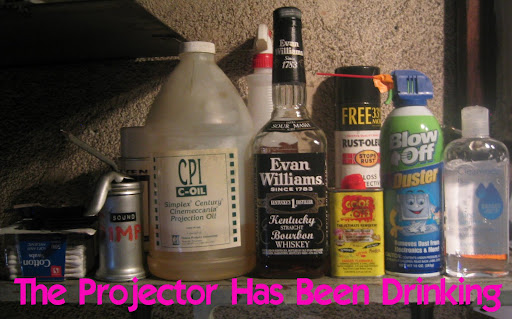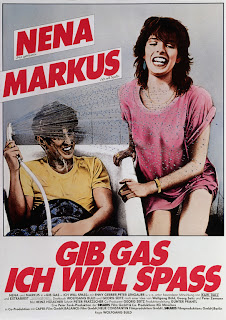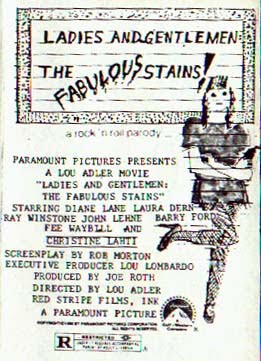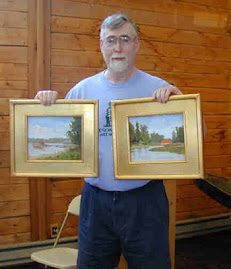Now, with the exception of Katja von Garnier's BANDITS in 1999 (which you can hear me rave about on my last appearance on The Popcorn Mafia podcast), I have long held a maxim for film posterity: Never let the Germans finance a musical! My primary evidence: N.F. Geria II Filmgesellschaft mbH, a German tax shelter consortium you've never heard of, is singlehandedly responsible for precisely these aforementioned two twin titans of misbegotten musicals. Most people allow me to stop there and say point taken. But if you need more evidence that Germany has at best a very slippery grip on what makes a viable song-and-dance diversion, I have exhibit two: a pair of chick-driven trifles that feel not only from another country, but in many moments appear to have come from another planet.
As with all other road maps to Hades, our story begins with good intentions. Filmmaker Wolfgang Buld had earned a solid reputation for his no-frills documentation of what were fringe music movements in the late '70's. His unofficial trilogy of PUNK IN LONDON, REGGAE IN BABYLON, and PUNK IN ENGLAND are still admired today for capturing many influential artists on their own turf and in their own words. Naturally, he wanted to parlay that talent into feature filmmaking, and in turn, producers hoped that someone so well steeped in music and youth culture could bring freshness into formulaic templates for the 14-28 demographic. But in the same manner as one-time Jean-Michel Basquiat contemporary Tamra Davis found herself trying to make Britney Spears have plausible grit in CROSSROADS, Buld attempted the task of making movie stars out of two of the leading figures of the purported "German New Wave," heartthrob Markus Mohr, and Gabrielle "Nena" Kerner.
Initially, Buld and his producing partners were thinking of a much more radically punk concept, a Ramones-ish romp called HURRAY, THE SCHOOL IS BURNING which would have done for German youth musicals what ROCK'N'ROLL HIGH SCHOOL did for the American style, and would have featured another worldly-popular German act, Trio (of that iconic "drivin' around with your pal aimlessly" song "Da Da Da") as both teachers and insane asylum inmates who get mixed up. But Trio bowed out due to touring fatigue and the company reconfigured the story into a more traditional road movie, an ersatz IT HAPPENED ONE NIGHT where a mismatched couple go off in pursuit of one's intended true love but naturally discover it's really each other's arms they should share, with musical interludes, what was known as a "singspiele", the kind of movie that, say, Bridget von Hammersmarck would have churned out during the backstory of INGLOURIOUS BASTERDS. In circumstances that certainly forsee the comically chaotic shoots of the rival breakdancing and Lambada dramas of the '80's, Buld and company had only started principal photography in October 1982 when distributor Constantin Film announced the film would be released in February 1983, so the production commenced without a finished script and composed scenes on the fly. Moreover, while Markus had initially been thought the audience draw (The opening half of the movie is given to his songs), Nena's popularity was growing, and she frantically commuted from recording sessions for her debut album to the shoot, while the directors tried to integrate as many of her new songs into the movie and design numbers around them; ultimately, she was given top billing on the finished release.
The resulting film, GIB GAS - ICH WILL SPAß! (STEP ON THE GAS - I WANNA HAVE FUN!), is, much like the aforementioned CROSSROADS, entertaining, but not for the intended reasons of its inception. From the moment Markus makes his first appearance in an otherwise snazzy jacket paired with shorts, white socks, and sandals (implying that his contribution to the German New Wave was preemptively dressing like your elderly future self at Leisure World), to the inexplicable use of actor Karl Dall in five different roles as some sort of Chris Elliot-style agent of chaos, to the multiple and rather incongruously dark moments of sexual threat against both protagonists, to extremely random homages to DIVA and DON'T LOOK NOW, one is left to wonder whether the preposterousness amidst the pop songs is an intentional act of bird-flipping by Buld and company (in a recent interview, the irascible Buld proclaimed, "German humour. There isn’t any; if Germans want to laugh, they start a war!"), or if this is honestly just one of those Deutsche things, what Norm Macdonald would try to encapsulate just by saying, "Germans love David Hasselhoff."
While the film was a regional hit, GIB GAS would not break out nearly as largely as its ascending star did. Nena's single "99 Luftballoons," recorded after the completion of the film, would become a surprise worldwide smash from late '83 to mid '84, more so in that almost all airplay and sales were for its original German-language version despite its availability in English, though that latter recording was a translation so badly phrased that I would not be surprised it was a deliberate act of sabotage on her behalf. Still today, "99 Luftballoons" has been a staple of '80's nostalgia on themed radio weekends and movies like BOOGIE NIGHTS and GROSSE POINT BLANK. Despite that humongous windfall, her movie did not benefit from her stardom: an English-dubbed export version was prepared under the title HANGIN' OUT, but never got picked up for distribution in Anglo territories, probably because of the fact that it did not contain the one song that made her reputation, and just how would you shoehorn an apocalyptic canticle of nuclear war into that finished film in the first place? (As Rahn Ramey taught me years ago, you can't cook something if it's done.) Thus, any English-language scholarship on the film is very hard to come by - I could only find one missive written in my tongue, written by the very brave Kurtodrome, and even the IMDb listing for GIB GAS features not one user review as of this writing, nor any message board action. I can only hope to effect change.
Nena's "other" American hit single, which proves she knew how to rhyme in the Kings'.
A sequel was definitely wanted by the creative team and the public, however Nena and Markus declined to participate. But as we all know, the lack of involvement from people that made a first movie a hit has never stopped anyone from going forward, and Buld and company crafted another movie that managed to be even less-plot driven and yet more bizarre than its predecessor, and also more absolutely naked in its primary goal of selling records. The West German equivalent to "AMERICAN BANDSTAND" was known as "FORMEL EINS", or "FORMULA ONE," and plenty of Top 40 bands would travel overseas to perform on that show as they would for Dick Clark's Saturday morning powerhouse. In keeping with their spirit of quick adaptation, the team fashioned another old-fashioned type of story - the aspiring singer/songwriter working up from the bottom - and tied it into the popular TV series, providing the convenient clothesline with which to hang one slumming second-tier pop act after another, and created DER FORMEL EINS FILM, which has been an endless source of der fun und frolic for me.
Retaining the same character name from GIB GAS but with a new leading actress, FORMAL EINS tells the story of a reluctant mechanic who dreams of being a pop star, and thanks to the usual convoluted turns involving her car and people skills, gets herself a job on the titular hit music program, while navigating a clumsy suitor who also works at the show. Replacement actress Sissy Kelling is about as pleasant a performer as Nena, but damn if she isn't just a little bit hotter. (Of course, introducing her with a nude shower doesn't hurt!) With the pout of her mouth, she often resembles Isabelle Adjani or a darker-haired Molly Ringwald. And she gets an awful lot of opportunity to use that pout and rolling of the eyes, as she deals with all the stumbling blocks in her career path, be they her crush's maladept wooing or the bizarre needs of the celebrity guests appearing on the program.
And let us run down the celebrity guests, which are the legitimately funniest part of the movie. Meat Loaf, in the midst of his European exile, pre-reconciliation with Jim Steinman, gets his diva fit pacified by styling Sissy Kelling's hair, a surprising field of expertise that would easily prove problematic to his current new pal Mitt Romney. Limahl, former lead singer of Kajagoogoo, besieged and nearly trampled by dozens of ravenous female fans (a likely Europe-only situation) after doing a big song in an industrial kitchen then being mistakenly thought to be having his way with Sissy. But hands down, the single-greatest sequence in the film belongs to the late Falco, who plays an ultra-vain version of himself obsessed with his vintage Cadillac convertible, suffering so much humiliation at the hands of the car, the rain, and Kelling herself, that he could have had a second career in physical comedy; in his best moments he reminded me of the great Bruce Campbell with a smaller chin. (And yes, you do get to see him perform "Rock Me Amadeus".)
I also really enjoyed the running gag of legendary German punk band (and sworn enemies of legendary German crooner Heino) Die Toten Hosen, portrayed as such music industry pariahs that their unscrupulous manager keeps trying to disguise and repackage them within other genres (beach rock, greasers, mariachis) to sneak them onto the TV show. (A gimmick that I always thought the equally craven Mr. Wiggs should try with his discredited Wiggies if by some miracle a sequel to STANDING OVATION were ever to be made.)
You also get treated to:
- Re-Flex, NOT singing "The Politics of Dancing," but "How Much Longer"
- The Flirts, NOT singing "Jukebox (Don't Put Another Dime in)" but "Dancin' Madly Backwards"
- Katrina and the Waves, NOT singing "Walking on Sunshine," but "Red Wine and Whiskey"
- Pia Zadora, and if you know any of her songs, you are a better man than I
Throw in another batch of incongruous elements like a shout out to Istvan Szabo's MEPHISTO and a third-act escape-from-the-draft sequence, and again, you are left to wonder if Buld is legitimately trying to create comedy or engaged in some deeper Andy Kaufman/Tim & Eric-style shenanigans. Considering that Buld has stated for the record, "I did my best films in the UK, in Germany I only worked for the money," I have to give serious consideration that perhaps in the grand tradition of Malcolm McLaren, he was indeed willing to deliberately offer crap for cash.
Much like its predecessor, though, it's hard to find anyone who'll document that they've actually seen it: I could only locate two other reviews in English on the web. Moreover, it's even harder to find any details in English or German about it's smouldering star Sissy Kelling - no Wikipedia page, no old Angelfire/Geocities fansite, nothing! All I can glean from her IMDb profile is that she has done a little bit of everything in entertainment: besides starring again as a musician in the "MONKEES"-influenced German band sitcom "BLAM!" in 1985, she has also been a casting director, written a TV movie, and more recently, served as assistant director on two recent English-language horror films directed by Wolfgang Buld: THE CHAMBERMAID and TWISTED SISTERS, both of which have received positive, completely non-ironic reviews from the horror press, suggesting that Buld has found his true cinema niche. An interesting note about their friendship is that about the same time as FORMEL EINS FILM's production, together they also wrote and directed the 1985 documentary BERLIN NOW featuring industrial noise pioneers Einstürzende Neubauten, indicating that this pretty lady has some decent punk bonafides of her own. If I have any readers in Germany or fluent in the language, I'm dying for some details on this broad.
In conclusion, I've done my best to tell you about the fun and freakiness of two movies financed and filmed by Germans. Does this mean that I have undercut my maxim about never letting Germans finance a musical? Well, if your concept of a musical is a film that has a solid plot, well-written songs, strong performances, and will move audiences to high emotion, then no, you need to let someone of another nationality put up the money for that venture. But in the case of THE APPLE, SGT. PEPPER, and these two entries, when someone can't intercept that attache case of cash, and that musical gets made, cherish that misfit movie like it was your third nipple: it's wrong, but it's beautiful all the same.


















